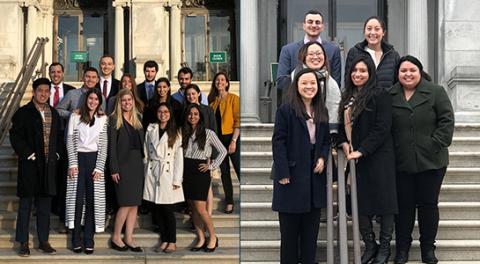UCDC: 10 Years of a Capital Legal Education

Ten years ago, the UCDC program opened its doors for students at University of California law schools to spend a semester in the nation's capital, where they get an unparalleled view of the country's legislative, court and policy-making machinery at work. Over the years, nearly 370 UC law students — including more than 100 from UCLA Law — have walked through those doors.
UCLA Law alumna Rachel Clark '17 enrolled in the program between her 2L and 3L years. Here is her advice to current students: "Do it…. Because it is in D.C, the program creates an atmosphere you can't get anywhere else, even in another big city."
Clark externed in the Department of Justice's Fraud Section, working predominantly on cases involving financial and securities fraud. She performed research, drafted motions, listened to a panel of women in leadership that included then-Attorney General Loretta Lynch, and sat in on DOJ settlement conferences, meetings with FBI agents and mock trials. "Being at Main Justice and seeing everything that happens there was just an amazing experience. It was just what I wanted to do," she says.
After completing the program, Clark retuned to UCLA Law to complete her degree. She then clerked for Judge J. Michelle Childs of the U.S. District Court for the District of South Carolina and Chief Judge Carl Stewart of the U.S. Court of Appeals for the Fifth Circuit in Shreveport, Louisiana. She has joined Jones Day's L.A. office as an associate.
The UCDC program accepts up to 35 students a year from the UC's five law schools — UCLA, Davis, Berkeley, Irvine and Hastings College of the Law. Participants extern full-time with government agencies, non-profits or advocacy groups. They also take a companion course, Law and Lawyering in the Nation's Capital, taught by UCDC Director Nicole Lehtman, a former federal prosecutor who has led UCDC for eight of its 10 years. Lehtman notes that UCDC is the only program in the capital "where students from different law schools come together for an immersive, semester-long experiential program."
Lehtman offers a foundation for practice in the capitol and brings in guest speakers from the highest levels of the executive branch agencies, Capitol Hill and nonprofits who offer students first-hand observations about working in Congress, drafting legislation and regulations, and the interaction between government and private sector forces that drives issues forward. Over the years, Lehtman says, she has worked to ensure that the course offers a broad view of legal work in Washington, providing context to complement the externships.
Lehtman often co-teaches the seminar with Robyn Thiemann, a former Deputy Associate Deputy Attorney General who is now chief of staff to the Drug Enforcement Administration. Thiemann says the course is among the valuable aspects of UCDC.
"There's no better way to determine whether government or public service in D.C. is for you than to spend time here experiencing it," Thiemann says. "And for those students who know that D.C. is where they want to be, a semester here provides them the opportunity to meet and network with people who may well later be in their professional orbit. That is truly priceless."
Jeffrey Prieto '95, a former general counsel at the U.S. Department of Agriculture and the Justice Department's Environment and Natural Resources Division, has been a guest lecturer and has mentored UCDC students. He says his goal was to illuminate the work of government attorneys and the importance of the public sector in public service work.
"People working in D.C. understand that, notwithstanding changes in the administration, there is this core group of professionals that serve a vital role," says Prieto, who today is GC of the Los Angeles Community College District. "Politics aside, I encouraged people to pursue a career in federal government."
While enrolled in UCDC, Stacy Lee '20 split her time between the international ocean advocacy group Oceana and the Justice Department's Environment and Natural Resources Division. She and her UCDC peers also weathered the government shutdown of 2018, which brought the capital to a halt for 35 days.
"No matter when you go to D.C. and whatever you do, you'll be experiencing history firsthand," she says. "You'll get a sense of how different organizations influence national politics and a valuable perspective you can apply throughout your career. No matter what background or career goal you have, you can benefit from getting immersed in law in D.C."